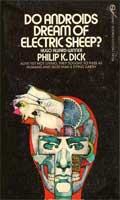Reviewed by clementine on
So, as we all know, I love dystopian books, etc etc. You may also know that Blade Runner is my second favourite movie (after The Godfather), and it's based loosely on this book, so it was imperative that I read it at some point. My mom asked me which I liked better, Blade Runner or Do Androids Dream of Electric Sheep?, and I found it really difficult to answer. Blade Runner really is loosely based on the book; the general premise of the android/bounty hunter relationship, as well as some character names, were the same, but the plot was overall quite different, and even some of the relationships between characters had been changed beyond recognition. It's a hard comparison to make since the movie is really not a direct adaptation of the book.
I really liked it, though. It was interesting. It was well-written. I loved the exploration of humanity, and it was pretty difficult to know whether or not to side completely with Rick or if the androids deserved sympathy. I thought some of the details like the empathy boxes and the burning societal desire to keep animals as a symbol of wealth and status were cool.
I think the biggest issue is that there were certain contradictions (specifically with the nature of the androids - although perhaps that was intentional) and that some things were not entirely clear. Mercerism should have been expanded upon more, I think, since the idea that Mercer is a fraud is a huge part of the climax. It didn't feel like it was central to the plot, though, so that revelation wasn't as shocking as I think it could have been.
I can't possibly write this review without making one big comparison to the movie, which is the idea of Rick Deckard's own humanity. In the movie, one of the most intriguing parts is wondering if he's a replicant or not (and he totally is. He definitely is, guys), whereas that subtext was left out of the book and explored with Phil Resch instead. I think it's one of the most compelling parts of the movie, to be honest.
I guess, to answer my mom's question, I would say I prefer the movie to the book - but it really does seem like an unfair comparison, since they are so deliberately different.
Reading updates
- Started reading
- 24 August, 2012: Finished reading
- 24 August, 2012: Reviewed
